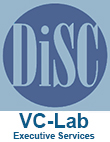
Authenticate Vocational Certainty™
with a PERSONAL LEADERSHIP ASSESSMENT
with a PERSONAL LEADERSHIP ASSESSMENT
|
VC-Lab Executive Services: Authenticate Vocational Certainty™ with a DiSC Personal Assessment Click Here for Fees / Enrollment |
Curriculum Description
Each lesson has a specific Learning-Competency Objective.
Each lesson has a specific Learning-Competency Objective.
Vocational Certainty and Leadership
Vocational Certainty™ is a measure of our faithfulness to our career agenda.
When we have been disciplined about developing our skills and talents, we can acquire
the self-esteem and confidence that accompanies earned success. Vocational Certainty™ challenges us to
become equipped by education, training and experience to perform effectively and grow in leadership.
Lesson 101: QM and Leadership
This lesson describes the Eight Attributes of a Quality Manager
and how they affect our leadership in real-life tasks.
Learning-Competency Objective: The learner will gain specific knowledge of the
Eight Attributes of a Quality Manager as a foundation for understanding all other course objectives.
Lesson 102: Make Sure of Your Calling and Vision
Many people, especially in nonprofit organizations, feel
called to their work. This lesson shows that true Vocational Certainty™ requires
specific attributes. (Includes the Value-Added Video: Knowing Where to Hit the Pipe.)
Learning-Competency Objective: The Learner will gain specific knowledge of how to
identify a person’s vocational strengths, weaknesses, character and personality.
Lesson 103: Commit to Personal Excellence
Success greatly depends upon a person's ability
to perform with excellence. In QM our goal is to make a reasonable
promise to every customer based upon our ability to perform with excellence.
This lesson demonstrates how inspiration and planning can improve effectiveness.
Learning-Competency Objective: The Learner will gain specific knowledge of
how to define and achieve reasonable standards for excellence.
Lesson 104: Press Toward Continuous Improvement
Setting productivity standards should be guided by our
knowledge of the people who are to perform on our behalf. This lesson describes
the three streams of QM motivation and how to establish and achieve reasonable
standards for quality.
Learning-Competency Objective: The Learner will gain specific knowledge of
human motivation in the workplace and how to increase productivity and prevent errors.
Lesson 105: Measure Your Performance Accurately
Performance is measured in money and human values,
especially when things go wrong. This lesson describes how to accurately
calculate the cost of quality, improve customer satisfaction and recover lost profitability.
Learning-Competency Objective: The Learner will gain specific knowledge
of how to identify and define obstacles to workplace efficiency and calculate the costs to eliminate them.
Lesson 106: Embrace the Obligations of Leadership
Leadership is indicated by how we handle the weight
of responsibility when routine business transactions or personnel matters spiral out of control.
This lesson describes three principles which can stabilize the legal and fiduciary responsibilities of managing people and processes.
Learning-Competency Objective: The Learner will gain specific knowledge for
applying “due diligence” to workplace details and the leadership skills required to manage risks.
Lesson 107: Subject Yourself to Reality Checks
A common technique of professional counselors is to help people
face the reality of their behaviors. Finding and subjecting ourselves to sources of truth and reality
can be very helpful in sorting through issues and providing a needed perspective. This
lesson describes some simple leadership reality checks.
Learning-Competency Objective: The Learner will gain specific knowledge of
the impact of poor workplace ethics on an enterprise, its customers and shareholders or contributors.
Lesson 108: Demonstrate Task Faithfulness
Every manager will face crunch-times when the commitments he or she
has made are tested by the shortage of time, energy and money. Successful leaders will
avoid acting instinctively and instead apply due diligence and reliable principles to their problems.
This lesson describes some easy ways to avoid hard lessons.
Learning-Competency Objective: The Learner will gain specific knowledge
of the causes and business costs associated with workplace negligence and how to avoid them.

